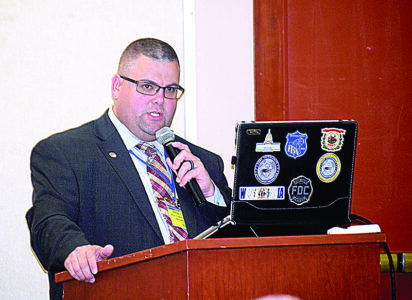West Virginia Senate Votes To Remove Marital Exemptions to Sexual Assault Charges

Photo courtesy of WV Legislative Photography Senate Judiciary Committee Vice Chairman Ryan Weld said a bill to end the marital exception in state sexual assault and sexual contact laws was following in the footsteps of the late Ohio County state Sen. Judith Herndon.
CHARLESTON – History came full circle Monday in the West Virginia Senate when lawmakers passed a bill removing the remaining marital exceptions in state law for sexual contact and certain sexual assault charges.
Senate Bill 190, modifying the definition of sexual contact, passed on a 22-9 vote, sending the bill to the House of Delegates.
SB 190 removed “marriage” from the definition of terms in the State Code sections dealing with sexual assault and sexual contact and marriage as an exception for sexual assault charges in the first and third degrees.
“Sexual abuse currently in code has an exception, known as the marital exception, so that if you are married to somebody and you touch them in a private area as a result of forcible compulsion, you cannot be convicted of a crime,” said Senate Judiciary Committee Vice Chairman and Senate Majority Whip Ryan Weld, the lead sponsor of the bill.
“This is not an incident where someone might merely grab somebody on the rear as they’re walking through the kitchen, but Instead, the touching is the result of forcible compulsion,” he continued. “The marital exception has existed in code for quite some time. I think now is the time to correct an injustice.”
A person charged with sexual assault in the first degree is one who has engaged in sexual intercourse and intrusion and who has inflicted physical injuries or used a weapon to coerce sex. The crime is a felony with penalties of between 15 and 35 years in prison and a fine anywhere between $1,000 and $10,000.
Third-degree sexual assault is when someone engages in sexual intercourse and intrusion with someone who is mentally defective or mentally incapacitated; or someone older than 16 who engages in sex with someone younger than 16 who is at least four years younger than the defendant. The penalties for a felony conviction include between five and 10 years in prison and up to a $10,000 fine.
“Within our criminal code, we have two crimes for sexual violence. The first is sexual assault,” Weld said. “(This) deals with generally what the public would identify with and know as rape. We also have sexual abuse, and that is the unlawful touching as result of forceable compulsion of somebody in a private area by another.”
West Virginia’s sexual contact and sexual assault laws were first put in place in 1976, spearheaded by the late state Sen. Judith Herndon, R-Ohio. Before 1976, State Code defined rape as the “…carnal knowledge of a woman by a man, not her husband, against her will by force…” Former Delegate Pam Shuman, D-Brooke, was also instrumental in updating the state’s sexual assault laws.
Weld, R-Brooke, is one of two senators who represent Herndon’s former district, along with state Sen. Laura Wakim Chapman, R-Ohio, who also voted for the bill. Weld talked about Herndon’s role in making changes to the state’s rape laws over the objections of lawmakers during her time.
“As one of only eight Republicans in the Senate and the only female in the Senate at the time, she worked to remove the marital exception from our sexual assault code,” Weld said. “This is carrying on what I believe to be the unfinished job she was unable to get done. She unfortunately passed away in 1980.”
There is also support for ending marital rape exceptions in state law by the House, which amended House Bill 5243, creating the Women’s Bill of Rights Act, to remove unwanted sexual contact from spouses as an exception to sexual offenses.



